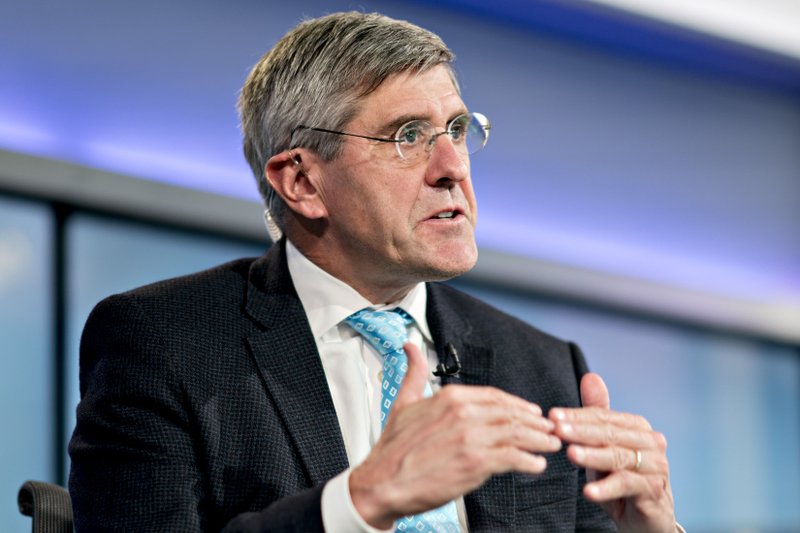President Donald Trump's selection for the Federal Reserve board of governors, Stephen Moore, pulled out of consideration for the job Thursday, hours after he said he was "all in" for the central bank.
Trump said on Twitter that Moore decided to withdraw, a move that came as objections mounted to his potential nomination among Senate Republicans.
"Steve won the battle of ideas including Tax Cuts and deregulation which have produced non-inflationary prosperity for all Americans," Trump tweeted. "I've asked Steve to work with me toward future economic growth in our Country."
Hours earlier, Moore said in an interview with Bloomberg News that he spoke to someone Wednesday at the White House and had no indication that he would not be nominated. "My biggest ally is the president," he said. "He's full speed ahead."
"I'm all in," Moore said.
Moore's exit comes less than two weeks after Trump's pick for another Fed seat -- former Godfather's Pizza Inc. chief executive Herman Cain -- withdrew from consideration as criticism related to sexual harassment allegations eroded support for him.
Moore was described by some critics as a threat to the Fed. In addition to being an unpredictable commentator and unorthodox economic thinker, Moore struck some economists as a partisan choice who might inject a short-term political agenda into monetary policy deliberations, which central bank independence is designed to guard against.
The 59-year-old chief economist of the conservative Heritage Foundation served as an adviser to Trump's 2016 campaign and wrote a book titled Trumponomics: Inside the America First Plan to Get Our Economy Back on Track. He holds a master's degree in economics from George Mason University in Virginia.
In a statement after Trump's tweet, Moore said he was withdrawing because "unrelenting attacks on my character have become untenable for me and my family and 3 more months of this would be too hard on us." He said he'd continue to be a "loud economic voice" advocating for Trump's policies.
He said in the earlier interview that he believed he'd win votes from some Senate Democrats if he could advance to a confirmation hearing before the chamber's Banking Committee.
But he said he'd withdraw if Trump decided that was best.
"I'm going to do what the president wants me to do," he said. "If he wants me to keep fighting, I'm going to keep fighting. If he thinks it's time to throw in the towel, I'll do that."
Moore expressed surprise at push-back to his candidacy from Senate Republicans, including Iowa's Joni Ernst and South Dakota's John Thune, the second-ranking GOP leader. They have raised concerns about Moore's past writings in which he disparaged women, and some senators have questioned whether he's sufficiently independent from the White House.
Moore said he doesn't always side with the president. For example, he said he disagreed with Trump's suggestion Tuesday that the Fed cut interest rates by as much as a full percentage point and resume bond purchases.
Moore said he was unsure whether it was appropriate for Trump to comment on Fed decisions, and allowed that it risked undermining the central bank's independence. He depicted himself as a potential maverick on the board with strong opinions; he called the Fed's December interest-rate increase "economic malpractice," before retreating and saying his words were "overly charged."
"I think if we can steer the discussion away from things that I wrote 20, 25 years ago and more towards what I believe in terms of the economy and Fed policy and how to create growth and stable prices, I think I am going to win a big majority," he said Thursday morning.
Moore told The Washington Post last month that he did not stand by any of the comments and that they were a "spoof," although he did not cite a particular column or explain a later piece in which he defended his remarks.
"The only thing less funny than some of Mr. Moore's tasteless, offensive, sexist 'jokes' was the idea that President Trump would even consider him for a seat on the Federal Reserve," Sen. Charles Schumer, D-N.Y., the top Senate Democrat, said in a statement. "Now President Trump must nominate two serious candidates who will strengthen our economy."
CNN reported in April that Moore had written columns for the National Review more than a decade ago that derided women, denouncing the "feminization of basketball" and arguing that women should not be allowed to be men's sports referees -- unless they are good-looking.
In 2000, in a column for the Washington Times, Moore wondered why women "showed up in droves in tight skirts" at college parties if "they were so oppressed and offended by drunken, lustful frat boys."
Moore also repeatedly made mocking references to his wife at the time, a stay-at-home mother, as a "loss leader" who "doesn't have a job."
Stephen and Allison Moore, who have three children together, were married for two decades before divorcing in 2011. Allison Moore began divorce proceedings in 2010, and her divorce complaint said her then-husband had opened a Match.com account and had a mistress.
Stephen Moore was found in contempt of court in 2013 for failing to pay his ex-wife more than $330,000 in alimony and child support, court documents show.
Then there's his spat with the Internal Revenue Service. A federal tax lien filed in the circuit court for Montgomery County, Md., where Moore owns a house, says that the government won a judgment against Moore for $75,328.80. The January 2018 filing said it was for unpaid taxes from the 2014 tax year and could accrue additional penalties and other costs. Moore has said he took a "mistaken deduction" and that he's subsequently overpaid his taxes.
Information for this article was contributed by Jennifer Jacobs and Saleha Mohsin of Bloomberg News; by Felicia Sonmez and Damian Paletta of The Washington Post; and by Christopher Rugaber and Marcy Gordon of The Associated Press.
A Section on 05/03/2019
